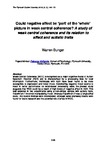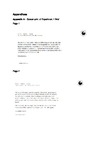Could negative affect be 'part' of the 'whole' picture in weak central coherence? A study of weak central coherence and its relation to affect and autistic traits
| dc.contributor.author | Dunger, W. | |
| dc.date.accessioned | 2019-05-15T10:41:55Z | |
| dc.date.available | 2019-05-15T10:41:55Z | |
| dc.date.issued | 2012 | |
| dc.identifier.citation |
Dugger, W. (2012) Could negative affect be 'part' of the 'whole' picture in weak central coherence? A study of weak central coherence and its relation to affect and autistic traits, The Plymouth Student Scientist, 5(1), p. 140-176. | en_US |
| dc.identifier.issn | 1754-2383 | |
| dc.identifier.uri | http://hdl.handle.net/10026.1/13970 | |
| dc.description.abstract |
Weak Central Coherence (WCC) is recognised as a major cognitive theory of Autism Spectrum Disorder (ASD) and is characterised by a processing bias for local information. Furthermore, individuals with ASD have been found to be more susceptible to depression and lower mood. Considering negative mood seems to result in better performance on detail-based processing tasks, the present study suggests that WCC could be a result of high levels of negative affect in ASD. This was explored in two experiments using a non-clinical sample with autistic traits. Experiment 1 involved manipulating mood, whereas Experiment 2 was a longitudinal study. The study‟s findings were inconclusive, although some promising results were found for future research and the potential role of affect in WCC. | en_US |
| dc.language.iso | en | en_US |
| dc.publisher | University of Plymouth | |
| dc.rights | Attribution 3.0 United States | * |
| dc.rights.uri | http://creativecommons.org/licenses/by/3.0/us/ | * |
| dc.subject | autism | en_US |
| dc.subject | Autism Spectrum Disorder | en_US |
| dc.subject | Weak Central Coherence | en_US |
| dc.subject | detail-based processing | en_US |
| dc.subject | depression | en_US |
| dc.title | Could negative affect be 'part' of the 'whole' picture in weak central coherence? A study of weak central coherence and its relation to affect and autistic traits | en_US |
| dc.type | Article | |
| plymouth.issue | 1 | |
| plymouth.volume | 5 | |
| plymouth.journal | The Plymouth Student Scientist |




